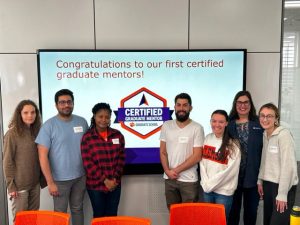Faculty secures million-dollar grant to address challenges in graduate education
March 31, 2025A four-year $1-million grant from the National Science Foundation will fund a new Clemson University program called EMPOWERS (Evaluating Mentoring Practices for Optimal Work-life Balance in Education and Research in STEM Graduate Studies). The initiative will tackle long-standing challenges in graduate education, including the need for effective mentoring, addressing the increasing levels of student distress, and augmenting professional development opportunities for graduate students.
The principal investigators (PIs) overseeing the program are Karen High, director of the Graduate Center for Transformational Mentoring (GCTM) and a professor in the Department of Engineering and Science Education, and Marieke Van Puymbroeck, the Graduate School’s associate dean for professional development, health and well-being, and a professor in the Department of Parks, Recreation and Tourism Management.
Mentorship is widely recognized as a critical factor in graduate student success, yet many faculty advisors are not formally trained to be effective mentors. This often results in inconsistent support, which can contribute to mental health challenges, high attrition rates, and diminished well-being among graduate students.
The GCTM and the Graduate School are advancing their commitment to graduate education and addressing the multifaceted challenges faced by students and faculty. We want to set a new standard for mentorship in higher education and foster a healthier academic environment,” Karen High, the successful grant’s co-Principal Investigator (PI).
The EMPOWERS program aims to create a transformative mentoring environment for faculty and graduate students by promoting holistic mentorship. “The program will serve the ‘whole student,’” according to Van Puymbroeck. “It addresses career development and professional skills but also mental health and wellness. By investing in holistic mentoring, we’re not just improving graduate education at Clemson—we’re creating a culture of support that will have ripple effects throughout the University and beyond.”
Broader Impact on Graduate Education
The grant will enable Clemson to train 400 faculty members across multiple disciplines in mentoring best practices. These efforts will enhance the mental health and career readiness of graduate students. Additionally, 800 graduate students will participate in mentor training, equipping them to become empathetic and effective mentors in their future careers.
The program’s long-term goals include advocating for university-wide policy changes to embed mentoring into tenure and promotion guidelines and the faculty manual. These systemic reforms will ensure that mentoring excellence is recognized and rewarded within the academic community.





















